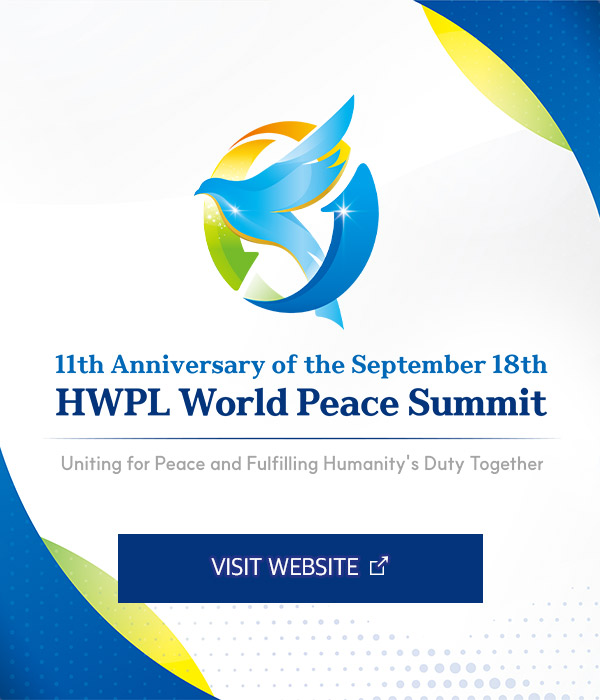WARP Office Dialogue of Scriptures in Poland “About Prayer”
World Alliance of Religions’ Peace (WARP) Office, one of the HWPL’s peace initiatives, is operating at 266 locations in 129 countries. In each office, Dialogue of Scriptures is actively held every month or every other week.
The moderator delivers HWPL news of the month and announces how the topic of the discussion of the day was derived and why it was selected. After that, the chairperson takes over and starts the discussion. More than three panels from each religion give a presentation that they have prepared on the question for the day, and religious leaders ask each other questions that come to their mind while listening to the presentations. Sometimes, the leaders answer questions from the audience. After deeply examining the answers from each scripture on the theme, the participants express themselves on how they have become more understanding of each other’s religion.
As such, the WARP Office is a venue for comparing scriptures and plays a role in achieving harmony and peace in religion. At the recent September 18th HWPL World Peace Summit, the religious leaders expressed their feelings about the WARP Office as follows.
Rabbi Rosh Gilberto Branco / Rabbi of Messianic Jewish Synagogue Beit Moshiach
I do not remember when I have been attending this WARP Office, but I think I will attend it forever. Usually, three to four people attend. We were thinking differently, but we were able to understand each other deeply by listening closely and respecting each other. And in the end, we were learning from each other. Let us continue to do this work together and spread peace around the world.
Sheikh Mohamad Al Bukai / Director of Islamic Affairs of UNI(National Association of Islamic Entities)
I am always happy to attend the WARP Office. In particular, we discussed the theme of peace that we all want today. This theme must be spread widely and shared with many people. The more we share, the greater our influence will be. Let us spread good news and work hard so that more people can join us. This is our dream. Dreams seem impossible, but they are possible if you think they are possible.
Now, HWPL would like to enhance your understanding on the WARP Office by introducing the Dialogue of Scriptures held under the theme of “prayer” on September 26th in Warsaw, Poland.

Since 2020, HWPL has gathered many religious leaders online across religions, denominations, and borders to pray for people around the world suffering from the pandemic and other problems. The form and language of prayer were different for each religion, but prayers were held for all religions, and everyone who attended experienced an amazing time of prayer led by the religious leaders according to their own rituals and manners.
Then, what is prayer? What is at the core of the act of prayer in each religion, and why did the act or ritual of prayer take on that particular form? What’s the purpose of prayer? These are the questions that the Jewish, Buddhist, and Christian panels answered.
1) What is prayer in your religion?
Rabbi David Basok / Judaism
In Judaism, the answer should be divided into two parts: biblical time and the “new” period of about 2,000 years.
During biblical time, it was natural for God and Man to talk, and God gave answers through the prophet. Many kings of the country asked the prophet what to do. Sometimes people could tell whether their prayer was accepted indirectly through the situation. People often requested for their needs – rain, health, protection, and peace.
However, this era has ended and Jews no longer receive direct responses from God. Everything changed when the temple of Jerusalem, which was the center of Jewish rituals, collapsed 2,000 years ago. Now many people pray for individual health and success, as well as to give glory to God. Prayer is the center of Jewish religion. We pray three or four times a day. Before we pray, we read some religious texts like the book of Psalms or other books of the Bible together. It’s better to pray outside, and you can do it at the synagogue or at the office. However, you should not pray when there are conditions that you cannot pray for. For example, if it is a place that you cannot concentrate well or that is not appropriate to glorify God.
There is also a leader when we pray together. Most of the prayer leaders in synagogues are men and do not need special skills. It doesn’t have to be a rabbi. In liberal Judaism, women can also be leaders.
Prayer is a very important ritual in Judaism, but for 2,000 years, rabbis prayed according to schedules. When praying becomes a ritual only, it is not natural and you do not pray from your heart. So, some rabbis say that you should pray rather briefly, but with good intentions, and you shouldn’t repeat the same words like a parrot.
Sensei Furyu / Zen Buddhism
There are many different kinds of prayers in Zen Buddhism. When we pray, we pray with texts from scriptures like Mantras, Sutras and Dharani. These texts are connected to wisdom and energy. We should pray to seek this wisdom from Buddha and Bodhisattva.
We have silent prayers, prayers out loud, ceremonial prayers for peace, and bowing prayers. Also, meditation called “Zazen” can be a prayer. Working, resting, and sleeping with an open mature state of mind are also prayers. We treat all spiritual practices as a prayer. Through a prayer, we can humble ourselves and achieve freedom and love. We can love others when we experience oneness.
Zen Buddhism is not about sitting still. Peace of mind can be naturally achieved through prayers. Peace will be with us when our heart is opened.
Milos Mohwald / Christianity
We often pray when we face something we cannot solve with our own power. We also pray when we need to find solutions or answers in some situations. People pray to the being who has higher ability than man. It is God in Christianity.
For believers, prayer is considered as one of the basic things in the life of faith. One who doesn’t pray is like a non-believer because prayer is a conversation between God and believers. We should pray often as if we are breathing. Also, it is not a one-way communication, which is just asking what we want. We should listen to God’s word. It is the same logic when we make friends. We don’t make any friends who are just asking us for what they want.
In 1 Samuel 12:23, it says “As for me, far be it from me that I should sin against the LORD by failing to pray for you. And I will teach you the way that is good and right.” As we can see, we should not fail to pray. It is because we can easily sin when we stop praying. It becomes hard to discern right from wrong. We cannot get closer to God. 1 Thessalonian 5:16-20 also mentions that we should pray continually. It is important because our heart gets closer to God through prayers.
Then, how should we pray? We can find the answers in Matthew chapter 6. In verses 31 to 32, it says that pagans (non-believers) seek what to eat, what to drink, and what to wear. It clearly says that God knows that we need them. Believers don’t need to pray for those things, but to pray for God’s kingdom and righteousness according to verses 33 to 34. What does it mean? When we look at Jesus’ prayer in Matthew 26:39, he prayed to God, “Please do according to your will, not my will.” He didn’t pray for himself, but for God’s work and righteousness. Also, we should be careful not to pray with wrong motives. According to James 4:2-3, God doesn’t receive those prayers.
2) What is the purpose of prayer in your religion?
Rabbi David Basok / Judaism
In Judaism, there was a big change the meaning of prayer in the Middle Ages. This brought a big philosophical question.
In Judaism, if I do something good, I will be rewarded, and if I do something bad, bad things may happen. For example, if I am sick now, it could be the result of my actions in the past. Then can I pray to get healed? If a person who prays is in a different situation, then can he deserve to get a different reality through prayers? Some Jews still believe that prayer can change God’s will, but mainstream Judaism drew new understanding that prayer changes people.
It is also said that prayer is an education and training for us to become better people. As we pray and seek what we need, prayer reminds us of the important things in our lives.
Sensei Furyu / Zen Buddhism
The purpose of prayer is to be freed from suffering. In order to do this, we should achieve awakening, a harmonious life, help others, and find peace, wisdom, true freedom, and love. We should share them all to others.
When we pray with a mature heart, then it will influence the whole universe and everyone in the world. We should be changed through prayers. When we pray, we do not just read the texts of Mantras, but we try to open wisdom. We are seeking wisdom and hoping to receive wisdom through prayers. We should remove obstacles in our heart and let wisdom flow in us. We should pray with sincere hearts to Bodhisattva so we can receive wisdom.
We should also pray for others. When we receive wisdom through prayers, we must apply them first and then be changed.
Milos Mohwald / Christianity
As I explained in the previous answer, the purpose of prayer should not be to only grant my wishes, but we should take account the will of God as He listens to our prayers.
In the Bible, there are many verses explaining this: in Proverbs 15:29, God listens to the prayers of the righteous. The Righteous means a holy person. One example of prayers of the righteous is the prayer of Solomon. He is a well-known king with great wealth and honor. When he prayed, he didn’t ask for long life, wealth or anything for himself, but prayed to receive wisdom for God’s people (1 King 3:11-12). God was pleased with this prayer as it was righteous. Therefore, Solomon was given not only wisdom, but also all wealth and honor. 1 Timothy 4:5 also explains that believers are sanctified as they pray according to God’s will.
Then, what is God’s will? He wants everyone to become one with Him and to be happy and live eternally. This is also the hope of believers. When God’s will would be fulfilled, then our hope will be fulfilled too. We should pray not only for my wishes, but also for God’s will to be fulfilled.
Prayer is a fundamental part of each religion. In Judaism, prayer was said to educate and train in order to transform into a better person, and it was said that 2,000 years ago, it was possible for people to receive a direct response from God. Zen Buddhism teaches that you can get enlightenment through prayer and be free from pain and suffering. All actions done, be it working, breathing or even sleeping, can be prayer if done with a mature mind and meditation. In Christianity, prayer is the help and response we seek from God for things we cannot do with our own powers. However, it is said that we should pray for God’s will, and not just for our individual, human wishes. As such, this WARP Office meeting was a meaningful time to find out the nature of prayer as an act of seeking truth in religion.


















